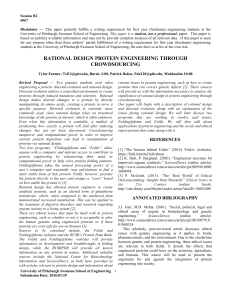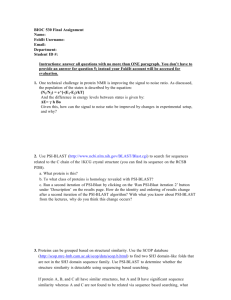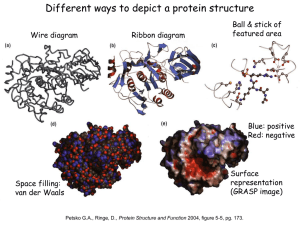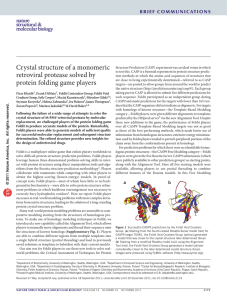How Protein Folding Game is Impacting Biotherapeutic
advertisement
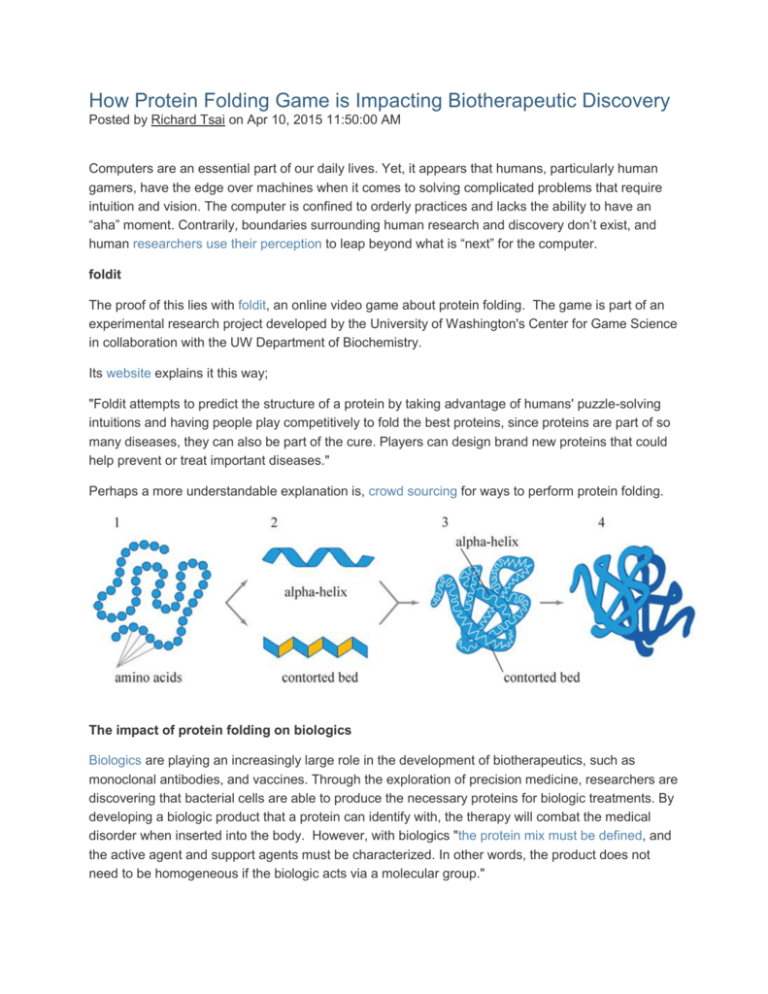
How Protein Folding Game is Impacting Biotherapeutic Discovery Posted by Richard Tsai on Apr 10, 2015 11:50:00 AM Computers are an essential part of our daily lives. Yet, it appears that humans, particularly human gamers, have the edge over machines when it comes to solving complicated problems that require intuition and vision. The computer is confined to orderly practices and lacks the ability to have an “aha” moment. Contrarily, boundaries surrounding human research and discovery don’t exist, and human researchers use their perception to leap beyond what is “next” for the computer. foldit The proof of this lies with foldit, an online video game about protein folding. The game is part of an experimental research project developed by the University of Washington's Center for Game Science in collaboration with the UW Department of Biochemistry. Its website explains it this way; "Foldit attempts to predict the structure of a protein by taking advantage of humans' puzzle-solving intuitions and having people play competitively to fold the best proteins, since proteins are part of so many diseases, they can also be part of the cure. Players can design brand new proteins that could help prevent or treat important diseases." Perhaps a more understandable explanation is, crowd sourcing for ways to perform protein folding. The impact of protein folding on biologics Biologics are playing an increasingly large role in the development of biotherapeutics, such as monoclonal antibodies, and vaccines. Through the exploration of precision medicine, researchers are discovering that bacterial cells are able to produce the necessary proteins for biologic treatments. By developing a biologic product that a protein can identify with, the therapy will combat the medical disorder when inserted into the body. However, with biologics "the protein mix must be defined, and the active agent and support agents must be characterized. In other words, the product does not need to be homogeneous if the biologic acts via a molecular group." Due to the complexity of protein folding, it is not easy to produce these biotherapeutics. Additionally, minor changes in the environment can destabilize the protein structure "leading to denaturation, aggregation, and precipitation." Through games like foldit, gamers are able to navigate the folding challenges without the environmental barricades and find potential patterns to assist in medical discovery. Foldit and Medical Discovery The foldit site has many protein puzzles where high-level gamers excel in improving and discovering leads to develop new medications. Foldit gamers have been key in four areas of medical research; HIV Ebola Cancer Alzheimer’s Disease HIV/AIDS In September 2014 foldit published a puzzle about HIV. For the last 10 years, researchers were unable to discover the structure of a protein-sniping enzyme vital for the reproduction of the AIDS virus. With the assistance of strategies provided by foldit game players, the problem was solved in three weeks. Together, gamers and scientists published a September 2014 paper in the journal Nature Structural & Molecular Biology. The article explains the way gamers provided key insights towards uncovering the structure of the particular enzyme. Ebola Since the most recent Ebola outbreak began reaching pandemic proportions, the interest in Ebola vaccines and treatments has been kicked into high gear. Already, several manufacturers have Ebola vaccines in their pipelines but the search for a treatment remains elusive. The question now is, for how much longer? In August of 2014, before the Ebola outbreak in West Africa, The University of Washington asked foldit players to undertake solving an Ebola puzzle. Already, several solutions from foldit players have been very promising and researchers are undertaking investigations of them. Zoran Popovic, director of the Center for Game Science at the UW, which runs foldit said; “We actually noticed that the scientists don’t know where to start. What foldit is doing is creating three, four, five possible places to start from.” Designing new proteins by grinding away at them is difficult, and often impossible if one does not know where to start. While the foldit contributions may not lead to clinical solutions, they are promising to find new starting points to assist scientists with their research. Cancer A protein known as Wnt is believed by most scientists to be an important part of vertebrate structure. However, scientists have found it difficult to gain a detailed understanding of this protein's structure. Accordingly, as far back as 2011 a puzzle was posted to help scientists better understand the structure of Wnt. Discovering the structure of Wnt is important for cancer researchers as many cancers are linked to defective Wnt. This particular puzzle is now closed, but the site has many others that focus on proteins and cancer. Alzheimer’s Disease The current theory for the development of Alzheimer’s disease is protein misfolding. As the seventh most common cause of death in North America, researchers have not been able to develop a medication that does more than offer symptomatic relief. Within the human brain, cells are constantly dividing and creating a byproduct called “Aβ polypeptide.” This peptide is released into the brain where they form two types of substances; toxic, soluble complexes called oligomers and insoluble masses called aggregates. These toxins and masses accumulate and start a massive neuronal loss in a person’s brain which, in turn, leads to progressive dementia and ultimately death. In November 2013, foldit announced it was publishing puzzles using information from researchers at the Swedish Royal Institute of Technology to help find protein treatment for Alzheimer's Disease. Can Gamers Really Help in Medical Research? The University of Washington in Seattle thinks they can. At about the time that the latest Ebola outbreak started, Vikram Mulligan from the UW’s Institute for Protein Design, put up an Ebola puzzle on foldit. The directions for the puzzle asked gamers to come up with potential entry points into the virus. Using these entry points he wants to gum up the Ebola machinery and block the Ebola virus’ capability to replicate. This would be the starting point for creating an Ebola treatment. To Mulligan’s surprise, around 500 of the approximately 300,000 registered foldit players accepted the challenge. More importantly, several gamers had top scoring designs or “hot spots.” These designs found places where a protein can bind to the virus. Mulligan said; “It turned out human intuition could solve this problem very, very well.” However, there are also some opposing views. Vijay Pande, a professor of chemistry at Stanford University and director of the Pande Lab remarked about the foldit success; “In this particular case, it seems to me that computation (not gamers) would be more successful” at designing a drug. Nevertheless, success is hard to argue with. Mulligan noted that gamers on foldit have been successful. They recently discovered a protein that binds to peptides in wheat gluten which is now beginning clinical trials. Scientists are hopeful it will alleviate the discomfort associated with celiac disease.

